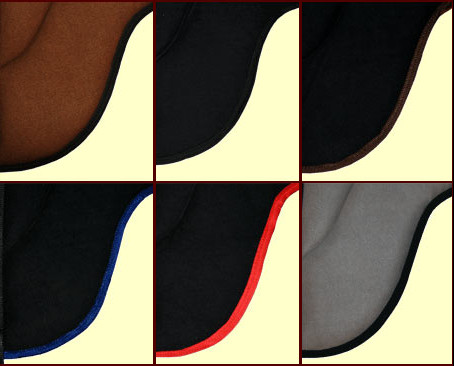Bareback pad For an independent seat. Machine washable

Why a Bareback Pad?
To develop a good, solid, and independent seat, it's beneficial to ride regularly without a saddle. A bareback pad is a handy tool: you have no stirrups, knee rolls, or other aids that force you into a specific posture on your horse. This allows you to train your independent seat while avoiding the discomfort of sweaty, itchy trousers covered in horsehair, thanks to the bareback pad.
Features of this Bareback Pad
This pad is machine washable and can be easily cleaned when necessary. The underside of the pad is made from specially woven soft cotton, which is very gentle on the horse's skin and helps prevent irritation. It feels very soft but is non-skid on the horse's back. Some pads use synthetic non-skid materials like Sympanova, which also do not slide but have been known to cause white hairs in the horse's coat. That's why we've chosen this cotton version.
The top side of the pad is made from a fairly firm material, providing more security on your horse compared to riding without it. The bareback pad has comfortable padding without being so thick or rigid that it undermines the feel of riding without a saddle. It is cut in a fine shape and adapts well to the horse’s back, making it suitable for horses with a high wither as well.
Biothane
The girth straps and the handle have been upgraded and are now of superior quality, made from Biothane. It's maintenance-free and remains 'good as new' indefinitely.
Sizes and Colours

There is one size available that fits most horses and ponies. Unlike a saddle, the length of a bareback pad isn't particularly important (although looks matter, of course). There is only pressure where you sit, so a pad that is too long is not problematic, unlike an overly long saddle. The pad can be adjusted with the included girth to fit a circumference of 158 to 245 cm, but you can also use your own dressage girth.
There are six different colour combinations. Other than colour, they are identical.
Stirrups?
We deliberately chose not to include stirrups on the pad or provide features for adding them. There are several reasons for this. Firstly, having stirrups on a pad is dangerous. If the horse jumps sideways and you lose balance, significant pressure is placed on one stirrup. A bareback pad, unlike a saddle, lacks reinforcement. Hence, it will slide to one side over the horse's back while your feet remain in the stirrups, with potentially serious consequences... Additionally, having stirrups contradicts the purpose of practicing an independent seat. More importantly, stirrup straps increase pressure on the horse's vertebrae significantly. All your weight then rests on the horse's back via a stirrup leather only a few centimetres wide. A saddle with a tree solves this problem by distributing pressure over a wide area. This is also why there are no bottle holders added: a bareback pad isn’t meant for very long rides as it doesn’t distribute pressure. Shorter sessions are fine, and if you're a lightweight rider with a strong horse, it's less of an issue, but generally, long distances are better with a good saddle while short rides work well with a bareback pad.
Summary of Benefits:
- Allows practice of a good independent seat
- Great feel with the horse, you sense exactly what it’s doing
- No sweaty, itchy trousers as with riding bareback
- More security than riding bareback thanks to stable materials
- Excellent non-skid properties with no skin irritation or white hairs (often an issue with Sympanova) thanks to the special cotton underside and the pad following the horse’s back shape
- Attractive appearance, great quality and fit, comfortable handle
- Comfortable even with bare legs
- No leather, machine washable
- Reinforced girth straps made of high-quality Biothane
- Includes girth, but allows use of your favourite girth, standard English girth straps
Maintenance
If you use the Bareback Pad and it becomes dirty over time, you can machine wash it. Brush off any loose hairs first, wash it in the machine on a program without spinning, with cold/cool water (maximum 30 degrees).
| Er ligt nog niets in je winkelwagen. |